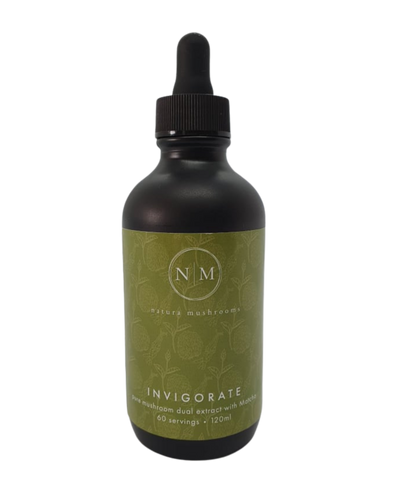Wake up in the morning, pop on the kettle and brew a warm cup of matcha. Bliss!
Buuut perhaps midway through this delightful morning routine it’s dawned on you… Is it ok to have matcha every day?
In a word, yes.
Having a daily dose of matcha is widely considered ok. And in many cases, it’s encouraged due to an impressive nutrient profile that can support immunity, heart health, metabolism, alertness and energy (to name a few).
But as with anything, it’s important to consume matcha in moderation and do what works for YOUR body. That includes weighing up the benefits, possible side effects and your unique sitch.
So what is matcha? What are the benefits? And what side effects should know about before you slurp down matcha like it’s going outta fashion? (it’s not)
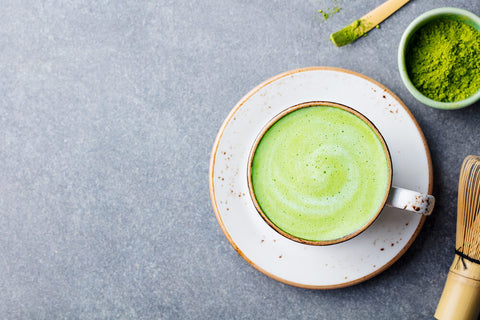
What is matcha?
We know what you’re thinking. Is matcha just a fancy word for green tea, steamed milk and majestic latte art?
And yes — it kind of is — but there’s more to the story.
Like green tea, matcha comes from the camellia sinensis plant, a small evergreen shrub that’s cultivated around the world (mostly so we can all experience the joy of tea and scones on a Sunday afternoon).
But the key difference between matcha and green tea is how they’re processed.
Matcha is made by taking the whole leaves of the plant and grinding them into a fine powder, which is then whisked into hot water or milk. On the flip side, green tea undergoes various processes (like heating and drying) before it’s stocked on our supermarket shelves and steeped in hot water.
We think Louise Cheadle (co-author of The Book of Matcha) puts it perfectly. Green tea “is a bit like boiling spinach, throwing away the spinach and just drinking the water, you will get some of the nutrients, but you’re throwing away the best bit.”
It’s why matcha is often worshipped as the holy grail of tea — it’s a more concentrated version that’s higher in vitamins, minerals, antioxidants and caffeine.
As for the flavour, matcha is grassy, slightly sweet and richer than green tea (given you’re actually consuming the leaves rather than only steeping them).
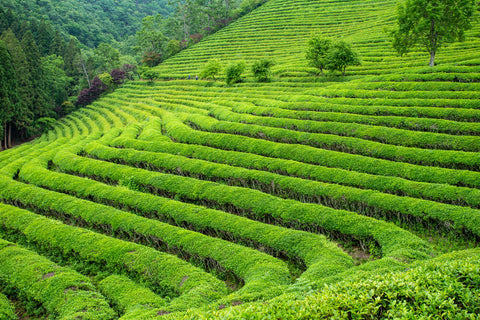
What are the benefits of matcha?
As you’d expect, the health benefits of matcha are similar to green tea. Except due to its higher concentration of goodness, the benefits may even be turned up a notch.
Studies are in their infancy, but research shows matcha may…
- Boost metabolism
- Increase energy
- Support the heart
- Boost alertness
- Bolster immunity
- Protect the liver
- Enhance brain function
- Promote healthy, glowing skin
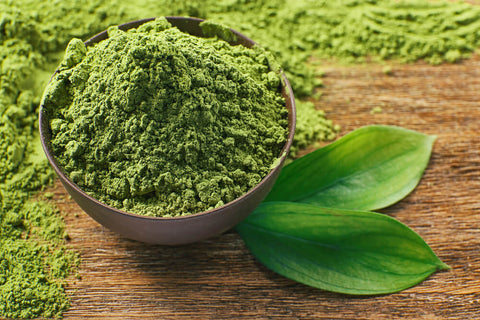
Are there side effects of matcha?
Ah, side effects. The rain-on-our-parade-ers.
While the benefits of matcha are plentiful, we can’t overlook the fact that it contains a noticeable amount of caffeine (and the side effects that may come with that).
Drinking too much caffeine may cause…
- Headaches
- Insomnia
- Irritability
- Diarrhoea
- Restlessness
- Anxiety
So, if you’re pregnant, breastfeeding or particularly sensitive to caffeine, you might choose to avoid matcha or drink it in small amounts.
In saying that, matcha contains slightly less caffeine than coffee, so it could be a great option for those looking to cut back (rather than cut out). Not only that, Matcha is rich in an amino acid called L-theanine(1), which also contributes to attention and alertness. And this combination of caffeine and l-theanine provides a gentler release of energy (without the jitters and crash).
Finally, we can’t stress the importance of listening to your body. While most will thrive and feel the benefits of drinking matcha daily — it might not work for everybody.
If in doubt, tune into your body and speak to a health practitioner you trust.
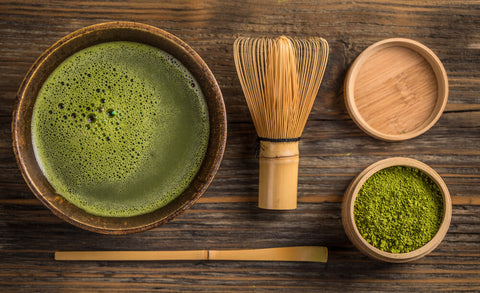
So, is it ok to have matcha every day?
For most people, matcha is safe (and incredibly beneficial) to drink every day. The l-theanine provides a gentler release of energy when compared with coffee.
But given matcha still contains a noticeable amount of caffeine, make sure you think twice before you start knocking back matcha lattes like water. The Therapeutic Goods Administration (TGA) in Australia recommends no more than 600mg of caffeine per day. [2]
What time of day should you drink matcha?
We love matcha first thing in the morning to energise our body, get our mind firing and prepare us for the day ahead. It’s also a great afternoon pick-me-up when you’re nodding off at your desk. If caffeine affects your sleep, we recommend consuming matcha first thing in the morning only.
How to have matcha tea
Making matcha is simple. Add your matcha powder to boiling water or steamed milk and whisk to dissolve the compounds. If you want to soften the flavour or add some sweetness, we recommend adding a dash of honey (word of warning: if you’re a first-time matcha drinker, you might find the flavour quite strong).
Matcha not your cup of tea, but still want to reap the benefits?
At Natura Mushrooms, we’ve combined the powers of brain boosting lion’s mane mushroom, performance enhancing cordyceps and energising matcha tea in our Invigorate Blend. Together, these ingredients work to reawaken your mind, body and spirit so you can get the most out of every day.
We recommend having 1 – 2 drops of our Invigorate Blend daily. Simple add it to your tea, coffee, smoothie or main meal.
Discover our Invigorate Blend today.
Resources:

